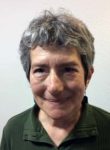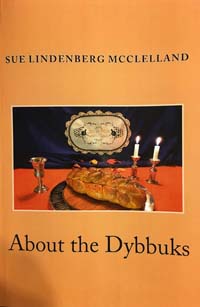By Pamela Pollack-Fremd

 SPOKANE, Washington — Immigration has never been easy–moving to a new country, learning a new language, and adapting to new cultural norms can be the most difficult thing a person ever does. Immigrating is not easy today nor has it been easy in the past. About the Dybbuks, a collection of short stories by Sue Lindenberg McClelland, addresses these issues from a personal/family point of view.
SPOKANE, Washington — Immigration has never been easy–moving to a new country, learning a new language, and adapting to new cultural norms can be the most difficult thing a person ever does. Immigrating is not easy today nor has it been easy in the past. About the Dybbuks, a collection of short stories by Sue Lindenberg McClelland, addresses these issues from a personal/family point of view.
Sue’s grandparents and extended family, those who survived the pogroms, immigrated to the Hill District in Pittsburgh, Pennsylvania, from Riga, Latvia in the early 1900s . The Hill District was full of Jewish, Irish, and Italian immigrants. Most were poor, and all were attempting to keep their native language and culture while at the same time needing to learn English, understand the new culture, survive, and prosper.
Dybbuks, wandering spirits or ghosts, haunt the living in almost every story. It is said that these spirits failed to cross over at death because they saw their reflection in an uncovered mirror during shiva. Following the laws and rules are important to ward off calamity and keep the world on an even keel. Despite their efforts to keep traditions and please Gd, the immigrants were frequently tormented by misfortune.
In one story, the oldest child, is overwhelmed with guilt when his younger brother dies, even though the oldest child was only seven himself. In another story the adored father and main bread winner in the family dies suddenly, throwing the family into emotional and financial turmoil. When the eldest son falls in love with an outsider, that causes chaos and distress.
The author adored her father, but she could rarely get him to talk about his family. Most of them were gone before Sue was born. However, she felt and was affected by her family ghosts. These stories are somber, humorous, and very human.
The book is sensitive and well written. The author, a retired therapist, understands human nature and the problems we create for ourselves. For the uninformed, including me, there is a helpful glossary of Yiddish terms in the back of the book. This was a peek into many of our ancestors’ experiences. It is also a reminder of the challenges immigrants face today.
*
Pollack-Fremd recently retired from teaching English-as-a-Second-Language at Mukogawa Fort Wright Institute in Spokane, Washington.